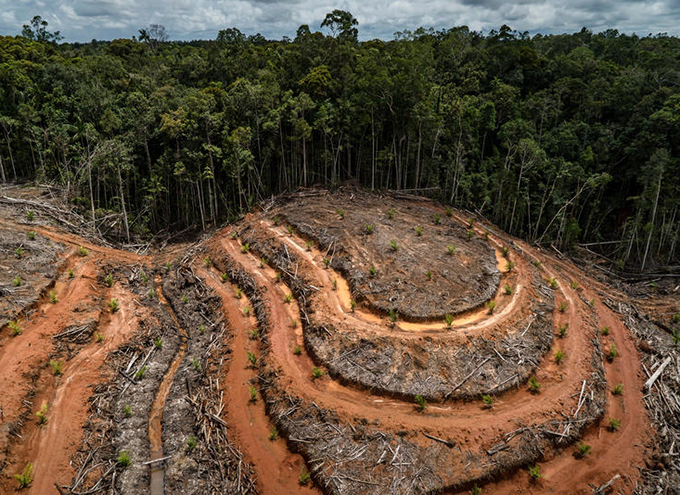 One of the massive deforestation areas in the PT Megakarya Jaya Raya concession in Papua, Indonesia. Other images show a lunar-like devastation over huge areas. Image: Greenpeace International
One of the massive deforestation areas in the PT Megakarya Jaya Raya concession in Papua, Indonesia. Other images show a lunar-like devastation over huge areas. Image: Greenpeace International
- Asia Pacific
- Asia Pacific Report
- deforestation
- Environment
- Forests
- Greenpeace Indonesia
- Greenpeace International
- Indonesia
- MIL-OSI
- Pacific Media Centre
- Pacific Region
- Pacific Report
- Palm oil
- PMC Reportage
- Politics
- Rainforests
- Reports
- Sustainability
- West Papua
- West Papuan deforestation
Greenpeace blasts palm oil industry deforestation in West Papua
Pacific Media Centre Newsdesk
A palm oil supplier to Mars, Nestlé, PepsiCo and Unilever is destroying rainforests in the Indonesian-ruled Papua region, a new investigation by Greenpeace International has revealed.
Satellite analysis suggests that around 4000ha of rainforest were cleared in PT Megakarya Jaya Raya concession between May 2015 and April 2017 – an area almost half the size of Paris.
The findings come as a delegation from the Indonesian government arrived in Europe last week to defend the palm oil industry, in response to moves by European Parliament to discourage the use of palm oil in biofuels on environmental grounds, Greenpeace International reports.
Luhut Panjaitan, the Coordinating Minister for Maritime Affairs of Indonesia, is visiting several European cities, including Brussels and Berlin.
“After destroying much of the rainforests of Sumatra and Kalimantan, the palm oil industry is now pushing into new frontiers like Papua, said Richard George, forests campaigner at Greenpeace UK.
“If the Indonesian government wants to defend this industry, the best thing it can do is to force it to clean up its act, not threaten to start a trade war.”
Photos and video taken in March and April 2018 show massive deforestation in PT MJR, a palm oil concession controlled by the Hayel Saeed Anam Group (HSA), including in an area zoned for protection by the Indonesian government in response to the devastating forest fires in 2015. Development is prohibited in these areas.
Supply chain
Although PT MJR is not yet producing palm oil, two other HSA subsidiary companies – Arma Group and Pacific Oils & Fats – supplied palm oil to Mars, Nestlé, PepsiCo and Unilever, according to supply chain information released by the brands earlier this year.
Each of these consumer companies has published a “no deforestation, no peat, no exploitation” policy that should prohibit sourcing from rainforest destroyers.
“Brands have been talking about cleaning up their palm oil for over a decade. Companies like Unilever and Nestlé claim to be industry leaders,” said George.
“So why are they still buying from forest destroyers like the HSA group? What are their customers supposed to think? What will it take to get them to act?”
This case also raises serious questions for the Roundtable on Sustainable Palm Oil (RSPO).
Many HSA Group palm oil companies are members of the RSPO, although PT MJR and the other HSA Group concessions in this district are not.
Members of the RSPO are not allowed to have unaffiliated palm oil divisions, and the development witnessed in PT MJR would also violate several of the RSPO’s Principles and Criteria.
Sourced from a Greenpeace International media release.
Article by AsiaPacificReport.nz
]]>





